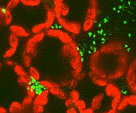Plant Pathology, Department of

Department of Plant Pathology: Faculty Publications
Document Type
Article
Date of this Version
8-15-2014
Citation
PLoS ONE 9(8): e105190. doi:10.1371/journal.pone.0105190
Abstract
Pine wilt disease (PWD) is native to North America and has spread to Asia and Europe. Lately, mutualistic relationship has been suggested between the pinewood nematode (PWN), Bursaphelenchus xylophilus the causal nematode agent of PWD, and bacteria. In countries where PWN occurs, nematodes from diseased trees were reported to carry bacteria from several genera. However no data exists for the United States. The objective of this study was to evaluate the diversity of the bacterial community carried by B. xylophilus, isolated from different Pinus spp. with PWD in Nebraska, United States. The bacteria carried by PWN belonged to Gammaproteobacteria (79.9%), Betaproteobacteria (11.7%), Bacilli (5.0%), Alphaproteobacteria (1.7%) and Flavobacteriia (1.7%). Strains from the genera Chryseobacterium and Pigmentiphaga were found associated with the nematode for the first time. These results were compared to results from similar studies conducted from other countries of three continents in order to assess the diversity of bacteria with associated with PWN. The isolates from the United States, Portugal and China belonged to 25 different genera and only strains from the genus Pseudomonas were found in nematodes from all countries. The strains from China were closely related to P. fluorescens and the strains isolated from Portugal and USA were phylogenetically related to P. mohnii and P. lutea. Nematodes from the different countries are associated with bacteria of different species, not supporting a relationship between PWN with a particular bacterial species. Moreover, the diversity of the bacteria carried by the pinewood nematode seems to be related to the geographic area and the Pinus species. The roles these bacteria play within the pine trees or when associated with the nematodes, might be independent of the presence of the nematode in the tree and only related on the bacteria’s relationship with the tree.
Included in
Environmental Microbiology and Microbial Ecology Commons, Forest Biology Commons, Other Plant Sciences Commons, Pathogenic Microbiology Commons, Plant Pathology Commons


Comments
Copyright (c) 2014 D. N. Proença, et al. This is an open-access article distributed under the terms of the Creative Commons Attribution License,